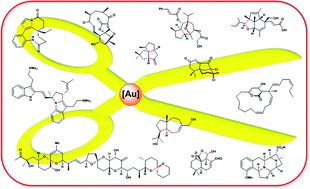Yun Zhang, Tuoping Luo* and Zhen Yang*
Nat. Prod. Rep., 2014, 31, 489
Novel organic reactions drive the advance of chemical synthesis in the same way that enabling technologies drive new scientific discoveries. One area of organic methodology that has undergone significant growth during the last decade is that of homogeneous gold-catalyzed transformations. This trend has been further enhanced by the employment of gold catalysis on a routine basis to accomplish the total synthesis of natural products. In particular, the superior π acidity of the cationic gold complex for the activation of alkynes and allenes towards nucleophilic addition has significantly enriched the toolkit of transformations available to the total synthesis community, and inspired a new era of creativity in terms of the strategic disconnection of target compounds during their retrosynthetic analysis. Instead of simply supplementing the many existing reviews of gold catalysis, this review has been organized from the perspective of synthetic target families, with particular emphasis on the use of gold-catalyzed transformations during the late stages of syntheses involving complicated substrates, and cascade reactions that significantly increase molecular complexity.
